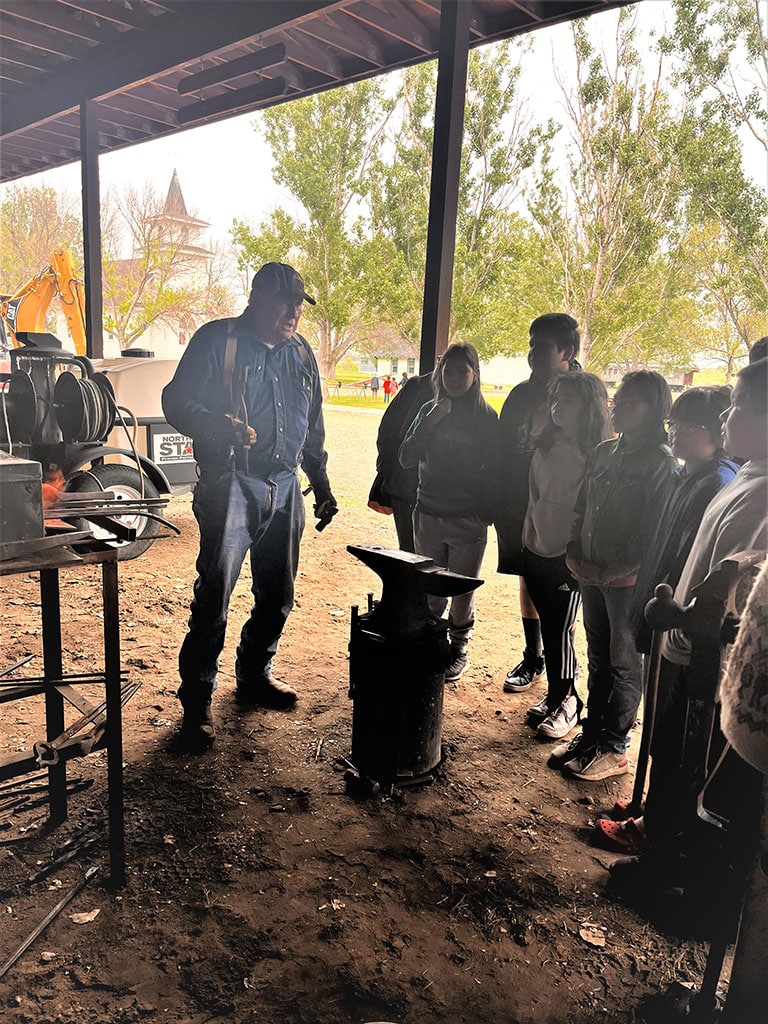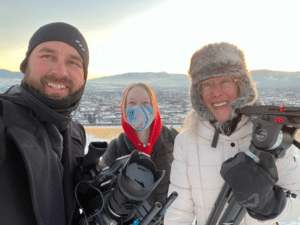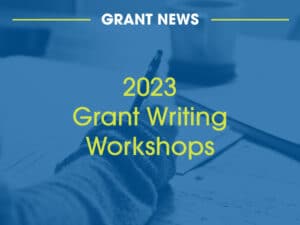Grantee Spotlight
Grantee: Big Horn County Museum, Hardin, MT
Award: $700 Opportunity Grant
Project: Kids History Day 2023
In April, Humanities Montana awarded Big Horn County Museum a small opportunity grant to support their living history day in Hardin. To help celebrate their successful youth history project, we asked Aleen Sellers, Executive Director, to share details of her project.
Can you give a brief history of your Humanities Montana-supported project?
Kids History Day is an event created by the Big Horn County Museum to encourage young minds from around the county as well as the surrounding area to learn about the rich history of Big Horn County and its homesteader history. The participants are mainly 4th graders; however, the museum does allow 2nd and 3rd-grade classes to join as well if a school can’t send their 4th graders. Once classes arrive for the day and break into their smaller groups, they start hopping from station to station to learn all about life on the plains of Montana. All the stations are created to show different aspects of life on the Montana frontier in the early 1900s.
This year there were 15 stations for kids to enjoy, including pan mining for fool’s gold, churning butter, learning how to make homemade bread, buying penny candies at our own western store, milking a cow, learning about the Crow Flag, looming and its history, washing clothes like a pioneer, learning about the importance of train depots in the west, learning how to be a blacksmith, how to grow a vegetable farm and how to make your own musical instruments at home. Each station’s volunteer becomes an expert on their station, teaching students about their station while having the students enjoy an interactive experience.
During lunch, the kids enjoy homemade ice cream made by volunteers with our very own vintage ice cream machines. After lunch all the students get a chance to participate in the main program, this year’s presenter was Miss Vi, better known as The Gypsy Cowbelle showcased her musical talent and got kids to play along on her homemade instruments. Since the students move around the stations in their own school groups these presentations are meant to be interactive to keep with the theme of the day and so that the kids get a chance to interact with students from other schools and make new friends. We try to change presenters each year, but some presenters are so wonderful we invite them back multiple years in a row.
All our volunteers and staff work very hard to provide the best experience for the students and we look forward to putting this wonderful event on every year!
In your opinion, what was the most notable accomplishment of your project?
I think for all of us who take part in the day the best feeling in the world is seeing the students get so excited to learn something new. Seeing a child’s eyes light up as our local blacksmith shows them how to use a forge or hearing kids ask questions about the best way to start their own vegetable gardens really makes all the planning worth it. History can be boring for so many students so being able to bring a smile to their faces and get them more interested in history is the greatest accomplishment of the day!
What lessons did you learn along the way?
I think this event really shows how even a one-day event can take months of careful planning and backup plans should something unexpected arise. We had rain right at the end of the day and thought that the students would want to cut the stations short or may not want to continue for the rest of the day. The reality was that all the kids had lots of fun and the rain didn’t slow anyone down. No amount of rain was going to stop anyone’s fun!
What else do you think Montanans should know about your project?
Events like our Kids History Day are a way museums or historical societies can get more of their local schools involved. History shouldn’t just be about looking at dusty artifacts on the shelf, it should be lived and enjoyed! Having events like ours can really help bring in more of your community.
How do you define the humanities?
People can connect through books, movies, food, music, and more. Humanities is learning about all those aspects and being able to connect with others so that we all better understand one another. Being able to better understand each other and our cultures can create stronger community bonds and a better understanding of how to cooperate in the future.
What advice can you offer to future Humanities Montana grantees?
Call the funders and ask questions, get clarity, or just check in to make sure you are on track. Most funders are more than happy to help, and it shows your determination for your project. I’d also say read and follow the instructions and guidelines carefully, this is a given, but making sure you are matching their guidelines can make a big difference. Don’t forget to show your passion for your project, they want to know why your project matters!





